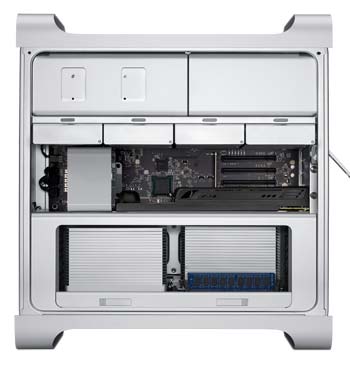When Apple Computer Inc. renamed itself to Apple Inc. (AAPL), the majority of investors and users didn’t think much about it. Analysts quickly dismissed the idea that the new name would actually signify a change in strategy which would have profound implications as the events of the following years unfolded.
Apple used to make the very best professional Macs in its entire history back in the late 90’s, at a time when the company’s prospects were dire and the threat of disappearing into oblivion was still looming large over its Cupertino headquarters. But with the growing success of its consumer product line during the first decade of the new millenium, the days of Apple products geared at IT pros were counted.
A Case Of Think Different Gone Bad
In order to improve its public image and lay a claim to uniqueness, Apple created the rebellious ‘Think different’ campaign at the turn of the century. But the company did not see fit to walk the walk. It did the exact opposite: it introduced uniform compliance.
With the release of Mac OS X 10.5, the days of the brilliant Mac OS X creator Avadis Tevenian at Apple were counted. Soon after the OS hit the market, Tevenian was shown the door.
The ousting of Avadis Tevenian, the creator of Mac OS X, was the first sign of the ongoing disruptive changes behind the curtains. A cultural revolution, if you will, occurred at the company with the departure of a few other brilliant nonconformists. Then a new bread of totally compliant top brasses climbed to the helm of Apple (all eleven Apple executives are, purely coincidentally, Caucasian males) with the likes of Tim Cook and Bertrand Serle. Then they embarked on decision making to appease.
In case you wondered, at Cupertino headquarters there is only one valid opinion: the one of its admittedly brilliant and nonetheless human CEO Steve Jobs. Whoever managed to stay employed at the company could get ISO certified for compatibility withe the opinions of the Supreme Leader and compliance. So much for Think Different.
In public Apple may never admit, but inside the company, a total reorganization was going on beginning around the time of Tevenian’s departure. The first visible sign of a product strategy heavily skewed in favor of consumers was delivered by Apple on February 19th, 2008, when the Apple Xserve RAID was axed. Apple’s loyal customers were told to the Promise Vtrak instead.
Then on July 30 2009 Apple finally discontinued Apple Shake 4.1, a powerful motion effects software, after having lowered the price of the product in June 2006 to just $499 to silence protests.
The reality distortion field around Steve Jobs spinned in a way that there where no reasons at all to be concerned with the future of the company. As the sales of the iPod, iPad and finally iPhone went through the roof and money poured in, the company became all the more arrogant.
On A Mission To Perdition
Obviously, Apple is on a radical mission to terminate Apple Pro products and the next step has been announced already. According to Apple’s website, the company decided to discontinue sales of Apple Xserve on January 31 2011.
In the spirit of full disclosure: this post was written and edited on an Apple Mac Pro.
It’s not about reviving flame wars between Apple and Windows users. Let there be peace. But it is high time someone finally shed some light on the direction Apple is headed and most of all how it might impact your investments in AAPL.
There have been a couple of tactical decisions Apple made in designing its product line which point to a clear intent: not integrating a Blu-ray player into any Mac, refusing to include the mainstream display and the HDTV connection standard HDMI in any Mac (except for the Mac mini), dismissing other popular standards such as eSATA and USB 3.0 as irrelevant. But that’s not all.
You may still remember when Apple was selling Mac OS X 10.5 (a.k.a. Leopard), ZFS (the Zetabyte file system) was touted as one of the major new features of the upcoming Mac OS X 10.6 (Snow Leopard). This state-of-art file system, developed by Sun Microsystems, was supposed usher in a new era of data storage for Apple’s customers. In the meantime, Sun Microsystems was acquired by its former arch rival Oracle Inc. (ORCL). Did Oracle demand license fees for the use of its intellectual property? We don’t know for sure, but what we do know is that Apple axed the project.
But how do these rejectionist and obstructionist policies add up for Apple? Well, HDMI is for Apple of course a ‘bad’ standard simply because Apple would have to pay about 4 cents per connector in license fees. Besides whenever you attempt the futile task of connecting a non-Apple branded display to a Mac, Apple cashes in again: $29,95 (plus shipping and taxes) per each DVI-to-mini-DisplayPort adapter. The same goes for Blu-ray, adopting Blu-ray would mean Apple would have to pay license fees to the arch rival and Blu-ray inventor Sony and to the Blu-ray consortium. Steve Jobs reportedly referred to Blu-ray as a “bag of hurt” presumably due to these license fees.
Apple wants you to shop for music and videos in the Apple iTunes Store and not for Blu-rays at Walmart. This is understandable, but what about professionals in in the business of non-linear video editing and post production, how are they supposed to handle Blu-rays? Without ZFS, it is not clear how Apple intends to make the archaic Mac OS file system, HFS+ Extended Journaled, fit to handle the kind of data storage requirements which are the hallmark of digital media production. Without the Xserve, products such as Final Cut Server make little sense and users of Apple’s flagship video editing suite, Final Cut Studio, will be left in limbo without nodes for their Compressor clusters.
The biggest cash cow for Apple so far has been the iPhone 4. The neglect of all pro products by Apple was a direct consequence of the smashing success Apple has experienced with mobile devices. But that success, at least in the cell phone market, might prove short-lived.
According to Garner, Android has been gaining momentum aggressively over the course of the last few months. A lasting success of the Android platform would undermine Apple’s dominance in the mobile sector. But while Microsoft’s Windows 7 Phone is a long shot at best, and a desperate attempt to play catch up with Apple and Google, the Android platform is a serious contender which can challenge Apple successfully. Over the long run, Android has the potential to displace Apple’s iPhone from the pole position Apple believes it is entitled to. If you think this scenario can’t happen, think again. According to Gartner, Android and Symbian are poised to lead the mobile OS market in 2012.
All in all, it’s a kind of a Deja-vu. Back in the 1980s, Apple was the most admired computer maker, mainly because of the original Mac OS, well until Windows 3.11 challenged Apple and by the time Windows 95 (and the subsequent Windows editions 98/ME/2000/XP) hit the market, Apple was fighting for its survival. A very similar scenario seems to be unfolding before our eyes.
Like with Microsoft DOS/Windows and the PC revolution, Google’s Android OS has created an open eco-system for cell phones, which is populated by multiple device makers. Unlike the iOS, the Android OS does support Adobe Flash.
With Android Apple has a formidable challenger. After all, what made Microsoft Windows a smashing hit wasn’t its superior quality but a thriving Windows eco-system. It certainly looks like Apple Inc. is repeating its mistakes of the past by deliberately excluding everyone else from the playing field it invented and is poised to suffer the consequences. Again.
What it means for investors in a nutshell: AAPL might be overvalued and a decline could be in the cards.



